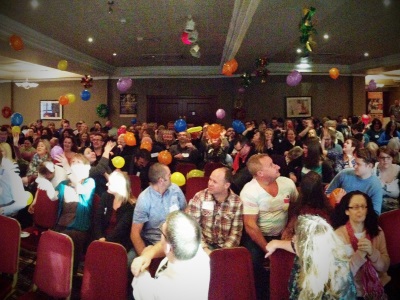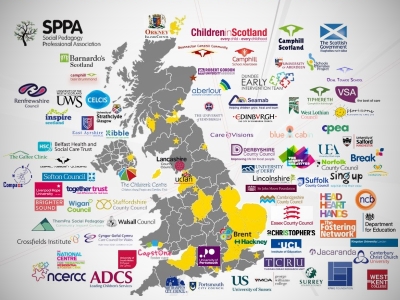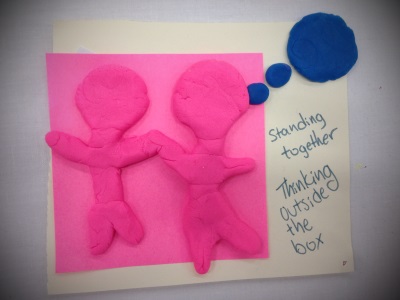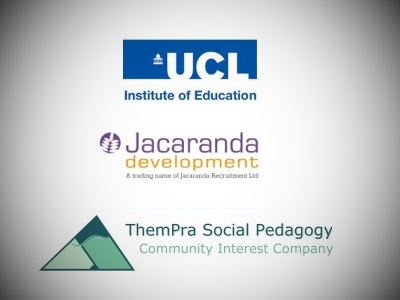Our Vision for Developing Social Pedagogy in the UK
Since the first social pedagogy pilot by the National Centre for Excellence in Residential Child Care in 2007, there has been an ever growing number of organisations exploring the potential of social pedagogy, and many different small and big projects have emerged across the UK. Whilst most of these projects have focused on residential child care settings, some also included foster carers, social workers, teachers, youth workers and early years’ professionals. Artists working with looked-after children have also shown a keen interest in the contribution social pedagogy could make to the creative arts.
Much of the enthusiasm around social pedagogy has been fanned by the fact that social pedagogy cannot be implemented by simply importing it from continental Europe. Instead, its implementation builds on existing good practice and connects to traditions in the UK closely related to social pedagogy, such as youth work (Eichsteller & Raper, 2006), social work (Smith & Whyte, 2007) or the Camphill philosophy (Jackson, 2011). In this sense there is much from which to develop a UK tradition of social pedagogy, some of which needs rediscovering, reclaiming or re-thinking. At the same time there is also something new and exciting about social pedagogy. It provides an overarching and coherent framework that focuses on holistic well-being and learning based on a positive concept of children as ‘rich’, competent and active agents. It offers sound theoretical concepts about the importance of developing strong, authentic relationships in order to support the inclusion of individuals into society. Many professionals can therefore identify with social pedagogy on a personal and professional level.
In order to provide a forum for professionals who are passionate about social pedagogy and want to explore it further, we decided to set up the Social Pedagogy Development Network (SPDN) in late 2009. Co-ordinated and facilitated by us at ThemPra, it is organised in partnership with Jacaranda Development, Treehouse Associates, the Centre for Understanding Social Pedagogy (CUSP) at the UCL Institute of Education, and the Social Pedagogy Professional Association. Its events are hosted by different organisations keen to share their experiences around social pedagogy. Over the course of ten years the SPDN has become a grassroots movement for people and organisations that are interested in social pedagogy and want to nurture it at a local and national level. This community of practice is underpinned by social pedagogic principles of engaging in open dialogue, valuing people and their experiences, and connecting with others in a democratic way. Social pedagogy is thus brought to life in people’s unique ways, and through the exchange and relationships with others we can ensure that it grows on ideas and traditions from within the UK, whilst also being inspired by ideas and traditions from other countries. For this reason the SPDN offers an ‘oasis’ that encourages a rich and colourful diversity of social pedagogy ‘flowers’ to blossom together. This means we provide the conditions for participants to engage with each other around the themes or issues that people feel most passionate about, thus enabling shared ownership for the SPDN.
Most importantly, the network is based on the idea of parallel action (Burns, 2007) which suggests that change occurs where people can pursue what matters to them. By forming self-organised ‘clusters’ they can initiate multiple, creative and parallel action streams which reinforce each other, thus leading to change. Parallel action streams could be regional networks of organisations interested or engaged in social pedagogy, higher education institutions wanting to explore how to incorporate social pedagogy into qualifications, people with an interest in restorative justice or therapeutic child care getting together to think how these relate to social pedagogy, different providers forming alliances to promote social pedagogy at a political level, or interested organisations exploring opportunities for (inter-)national exchanges – the SPDN provides the forum for such groups to emerge. Following Margaret Mead’s words, the SPDN is about bringing together small groups of thoughtful, committed citizens in order to make a difference.
To keep the development of social pedagogy diverse and colourful, we want to enable as many organisations as possible to be part of this dialogue. Therefore places are free of charge, with different organisations agreeing to host one of the biannual meetings. So far, the SPDN has brought together over 1,250 participants from more than 200 different organisations. Interestingly, there has been a fantastic mix of participants’ backgrounds, ranging from frontline practitioners, senior managers and policy-makers to students and academics – some with an emerging curiosity about social pedagogy, others with a well-rounded understanding. All of them have been keen to bring their passion and expertise to the table and thus engage in the dialogue from a social work, youth work, residential child care, foster care, outdoor education, teaching, early years, children’s advocacy, family support, community work, health care and psycho-therapeutic perspective. Through the enthusiastic interest within Camphill Communities we’ve also had participants working with adults with disabilities bring their tradition and philosophy to social pedagogy, thereby demonstrating the relevance of social pedagogy for adult services. In a social pedagogical spirit we welcome further perspectives at the SPDN.
Each SPDN event aims to provide a flavour of social pedagogy to those who are relatively new to the subject whilst also offering opportunities to further develop the wider discourse around social pedagogy. We have previously done this by exploring particular themes over different events, usually initiated by a short presentation from a leading academic and then further discussed by all participants. However, not least since there are now frequent conferences on social pedagogy, we have recently revisited the foundational vision of the SPDN as a grassroots movement concerned with developing social pedagogy from the ground up. What distinguishes the SPDN events from a conference is the strong emphasis on dialogue and providing an open forum for participants to relate their own thoughts and perspectives. By jointly engaging in a meaning-making process we can arrive at a better understanding of what the key principles are in social pedagogy, how social pedagogy can be conceptualised in different practice settings and what it can contribute to improving these. This process is further made meaningful through several organisations sharing examples from developing social pedagogy within their organisational culture in different ways and their experiences, challenges and learning.
As social pedagogy is about engaging with ‘head, heart and hands’, SPDN events also have an active aspect to them. Besides the enjoyment and energy built up through these social pedagogical activities, they help provide participants with a practical understanding of what social pedagogy is about as they help build positive relationships between participants by engaging in a shared activity – or what social pedagogues call ‘the Common Third’. For instance, the process participants went through when given a challenge – to build in small groups with very few materials a protective device for a raw egg about to be dropped from a balcony – led to fascinating reflections about how relationships had quickly developed amongst people who had never met but had to solve an intriguing challenge together; how different roles were developed, allocated or claimed within each group and what contributions these roles could make within a group; how important it was to groups whether the egg would break and how they valued the process compared to the outcome; and how participants drew on their creativity to find unique solutions for protecting the egg, realising that their creativity was perhaps the most important resource.
Whilst the SPDN offers unique opportunities for participants’ own professional development, its main concern is to help participants connect to like-minded professionals both regionally and nationally in order to influence wider change for children and young people. The idea is very simply to ‘be the change you wish to see in the world’ as Gandhi stated. This spirit seems to strongly resonate with participants who bring to the SPDN a palpable passion and determination to use social pedagogy as a catalyst for improving conditions for children and young people. For them, social pedagogy encapsulates why they decided to work with children and young people in the first place and connects to their professional and personal philosophies, which is why it brings out a level of passion which has much impressed international guests who have joined some of the SPDN meetings in the past. Considering the collective determination, the future seems a little brighter and we hope that more participants from a wider range of professions are eager to join us at one of our next meetings to help us develop more compelling visions of how to improve services for children and young people through social pedagogy. If you would like to become involved in the Social Pedagogy Development Network or receive further details, we look forward to hearing from you – all you need to do is send us an email. You can find further details about previous SPDN meetings and social pedagogy more generally on our website, and you can also register your place at the next SPDN meeting.






